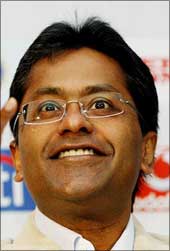 Indian Premier League's commissioner Lalit Modi is right to be exultant after the results of the auctions for the two additional teams for the 2011 season.
Indian Premier League's commissioner Lalit Modi is right to be exultant after the results of the auctions for the two additional teams for the 2011 season.
At Rs 3,235 crore (Rs 32.35 billion) for the Pune and Kochi franchises, the total haul almost equals the Rs 3,330 crore (Rs 33.30 billion) that the IPL netted from selling eight teams in its first season in 2008.
These are awesome valuations for a tournament that is just three years old and for auctions that have taken place at the tail-end of an economic slowdown.
By international standards, though, IPL valuations lag those of other popular sports -- like soccer, basketball and American football -- by leagues.
For comparison, consider that the 10 IPL teams together could be worth roughly $3.5 billion -- a tad less than the world's two most valuable sports teams on the Forbes rankings, Manchester United and Dallas Cowboys of the US National Football League (NFL), put together.
Note, however, that Manchester United is a 132-year-old club and it plays in tournaments that have been around for decades -- the most recent of them is 18 years old. The Dallas Cowboys is nearly 50 years old and the NFL is heading for its 90th year.
The IPL, then, may be a whippersnapper in the global scheme of things, but it has certainly proved more recession-proof than its elderly global counterparts.
The Pune franchise is worth more than half the value of the New York Knicks, which is the most valuable team in America's iconic National Basketball Association (NBA) league.
The NBA, it should be noted, is 64 years old and the US recession has taken its toll -- 2008 valuations (the latest for which figures are available) were either stagnant or had fallen marginally over the previous year.
In contrast, the Pune franchise marks a 64 per cent premium over the price that Mukesh Ambani paid to acquire the Mumbai Indians in 2008.
It is also worth noting that all the prominent sports tournaments are facing problems of huge debts and burgeoning expenses.
In the English Premier League, the world's most-watched tournament after the World Cup, the combined debt of 18 out of its 20 clubs exceeds their revenues (two clubs are bankrupt).
Complaints that player costs have been spiralling out of control are growing louder on both sides of the Atlantic -- invoking parallels with the global investment banking crisis (unchecked executive pay).
In contrast, IPL has altered the dynamics of cricket in a more fundamental way than Kerry Packer's 'pyjama cricket', and seems to be facing no such problems.
No wonder, every IPL team owner is salivating at the higher valuations that they believe are inevitable, going forward. That's something few sports team owners elsewhere can boast of right now.










 © 2025
© 2025